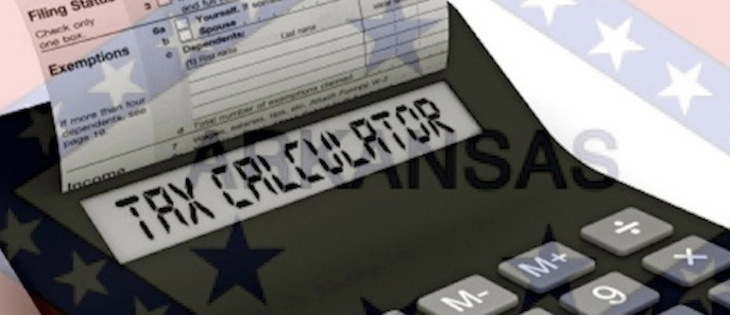State budget coffers boosted by sales tax growth, consumer spending in July
by August 2, 2018 12:35 pm 350 views

Arkansas budget coffers were flush with new revenue entering fiscal year 2019 as strong sales tax collections and rise in car purchases reflected near across-the-board growth in most segments of the state’s economy, according to the monthly revenue report released Thursday (Aug. 2) by the Arkansas Department of Finance (DFA).
Based on DFA’s monthly revenue total, state fiscal officials reported that Arkansas jumpstarted the new fiscal year with net available revenue at $469.3 million, up $14.9 million or 3.3% above year ago levels, and $9 million or 2% ahead of the state’s forecast for the 12-month period that runs from July 1, 2018 to June 30, 2019. July gross general collections, a broader economic indicator that includes collections from all available categories, also increased by $7.7 million to $531.8 million, up 1.5% compared with the same period of fiscal 2018, and $7.2 million or 1.4% above the general forecast.
Arkansas ended fiscal year 2018 with a tidy surplus of nearly $42 million as moderate growth from sales tax collections and strong payroll additions to the state’s growing labor force in June pushed net available general revenue collections to $5.49 billion, up $146.3 million or 2.7% above year ago levels, and $41.7 million, or 0.8% above the state’s forecast. Gross tax revenue rose by 2.7% to $6.726 billion, up $174.7 million above the same period in fiscal 2017.
Statewide, general revenues are primarily driven by individual and corporate income tax collections, sales taxes and other smaller pockets of revenue collected by the state. DFA economist John Shelnutt said sales tax collections were above the forecast and year ago levels with contributions to growth mainly from consumer expenditures and strong car purchases in Arkansas, which could face headwinds in the months ahead as higher interest rates and trade tariffs push auto prices higher.
“I would say sales tax collections are the main story with high growth again this month after a good gain in June collections. That growth in both months came from the retail sector as consumers drove results. Auto sales collections were down in June but rose in July collections,” said Shelnutt, DFA’s director of economic analysis and tax research.
AUTO SALES
Arkansas’ volatile car sales could face headwinds in the months ahead. Last week, Atlanta-based Cox Automotive forecasted that U.S. new-vehicle sales through July are slightly up from a year ago but are expected to slow down in the second half of 2018.
“The U.S vehicle market remains strong and all the talk of higher interest rates and trade tariffs are not chasing away buyers,” said Charles Chesbrough, senior economist at Cox Automotive. “In fact, the threat of higher prices on the horizon may be driving more shoppers to the showrooms now.”
However, Chesbrough added: “Buying conditions will not be getting better in the second half. Gasoline prices remain elevated, higher interest rates are having an impact on household budgets, and consumer confidence, while still very high, is lower than it was earlier this year. Further, auto manufacturers are demonstrating some pricing discipline as dealer inventories are at a manageable level.”
Kelley Blue Book on Wednesday also reported that the estimated new vehicle prices jumped by nearly $1,000 in July, up 2.9% from a year ago.
“Average transaction prices rose 3 percent year-over-year, thanks to market demand quickly backing away from cars,” said Kelley analyst Tim Fleming, noting more consumers are now opting for pricier SUV and truck purchases.
Overall, July sales tax collections totaled $209.4 million, an increase of $9.8 million or 4.9% compared to the same period in fiscal 2018. Collections, which received an 8.9% bump in motor vehicle sales taxes, were above monthly forecast levels by $1.9 million or 0.9%.
THE JULY NUMBERS
July individual income tax collections declined by $236 million declined by $4.1 million, or 1.7% to $236 million, but came in ahead of forecast by $900,000 or 0.4%. Those totals were impacted by a 2.1% decline payroll withholding due to a payday timing difference, Shelnutt said. Corporate income tax collections were mostly flat at $30.7 million, which is $400,000 above year ago levels and $2 million above forecast.
Corporate and individual income tax refunds came in below forecast, which add to funds available for state use. Personal income tax refunds totaled $12.5 million, which is $2.2 million above forecast and $500,000 or 4.1% below expectations. Corporate income tax refunds were only $700,000, $100,000 above year ago levels and $700,000 below the state’s forecast.
The July totals also included an annual deposit of $19.4 million from the Arkansas State Auditor’s unclaimed property program. That is slightly behind the program’s $21.4 deposit a year ago, which boosted state budget coffers by $1.4 million.
OTHER TAX REVENUE SOURCES
Alcoholic beverage
July 2019: $5.6 million
July 2018: $5.4 million
Games of skill
July 2019: $5.6 million
July 2018: $5.1 million
Tobacco
July 2019: $18.3 million
July 2018: $17 million
Insurance
July 2019: $600,000
July 2018: $800,000
